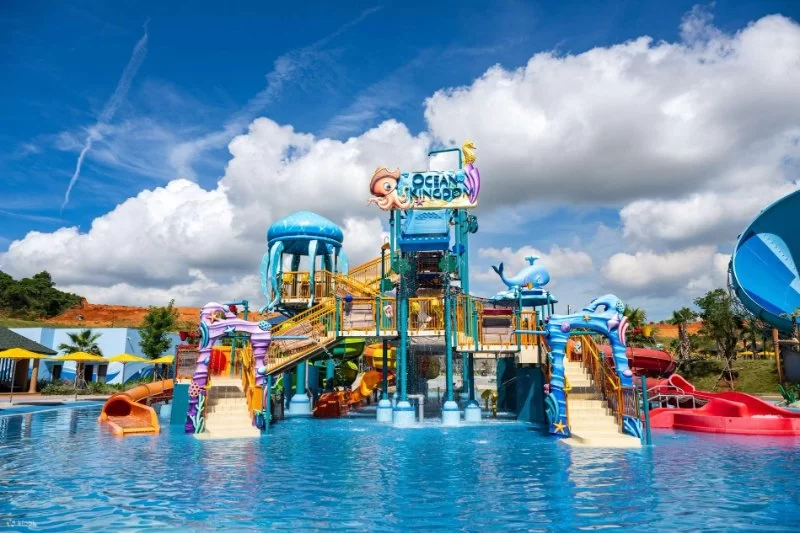
- respecting-personal-space-and-queues
- proper-swimwear-and-hygiene-matters
- pool-safety-rules-are-for-everyone
- be-considerate-of-families-and-young-visitors
- real-stories-that-teach-etiquette-lessons
- why-water-park-helps-you-have-a-better-experience
1. Respecting Personal Space and Queues
One of the foundational aspects of water park etiquette every visitor should know is how to respect others' space. Water parks get crowded, especially on weekends or during summer holidays. Cutting in line, crowding someone on the lazy river, or splashing strangers may seem harmless but can ruin another family’s day.
Stay patient in lines, keep a respectful distance on rides, and remember that not everyone enjoys unexpected cannonballs. Being mindful of personal space helps keep the atmosphere friendly and enjoyable for all ages.

Rolling Hills Water Park
7660 Stony Creek Rd, Ypsilanti Township, MI 48197, USA
2. Proper Swimwear and Hygiene Matters
2.1 Dress the Part
Wearing proper swimwear isn’t just about looking good—it's about safety and sanitation. Many parks have strict dress codes for a reason. Loose clothing can get caught in slides, and non-swim fabrics don’t dry properly, increasing the risk of rashes or discomfort.

Grayslake Spray Park
250 Library Ln, Grayslake, IL 60030, USA
2.2 Pre-Shower Isn’t Optional
Taking a quick rinse in the shower before entering pools may feel unnecessary, but it greatly reduces the bacteria and oils entering the water. It's a small act that makes a big difference in water quality. Teach kids this as part of the adventure—it builds good habits early.
2.3 Keep the Pools Clean for Everyone
From avoiding food near the water to making sure toddlers wear swim diapers, hygiene matters. If you or your child feels unwell, it’s okay to skip the water attractions for the day. Your fellow visitors will thank you.
3. Pool Safety Rules Are for Everyone
3.1 Lifeguards Are There for a Reason
Whether you’re 5 or 55, following lifeguard instructions is non-negotiable. Lifeguards enforce rules not to spoil fun, but to keep everyone safe. Running on wet concrete or attempting stunts on slides isn’t brave—it’s reckless.
3.2 Know Your Limits
If a ride is marked “not recommended for weak swimmers” or requires a certain height, don’t try to bend the rules. These limitations exist for your protection. If your child is unsure in deep water, provide them with a Coast Guard-approved vest—even if they feel "too old" for one.
3.3 Supervise Young Children Closely
No lifeguard can replace attentive parenting. Stay within arm’s reach of toddlers in any body of water, and never assume another adult is watching them. You’d be surprised how quickly distractions can lead to danger.
4. Be Considerate of Families and Young Visitors
4.1 Loud Isn’t Always Fun
Screaming with excitement is natural, but shouting across pools or playing loud music disrupts others’ enjoyment. Keep conversations and music at a reasonable level, especially near family zones or toddler pools.
4.2 Share the Space
Whether it’s lounge chairs, floaties, or splash zones—everyone deserves a turn. Don’t hog the wave pool edges or “claim” picnic tables for hours on end. Being generous with space fosters a communal, relaxed atmosphere.
4.3 Respect the Pace of Others
If you're moving quickly from one attraction to another, that’s great—but be careful not to shove past children or those with mobility challenges. Families with strollers, seniors, or kids with sensory needs appreciate the extra patience.
5. Real Stories That Teach Etiquette Lessons
5.1 The Teen Who Cut the Line—And Got Sent Back
At a water park in Florida, a teen tried to slip into a slide queue halfway through. A nearby family spoke up, and a lifeguard calmly asked the teen to return to the start. He complied, but the moment sparked a conversation between parents and kids around respecting others’ time. A little embarrassment went a long way toward learning the rule.
5.2 Lost Sandals and Stranger Kindness
During a busy Saturday at Water Park, a 6-year-old girl lost her flip-flops near the kiddie pool. A fellow parent picked them up, dried them, and waited for the family to return. It was a simple act, but it showed how water park etiquette is also about empathy, not just rules.
6. Why Water Park Helps You Have a Better Experience
Understanding water park etiquette isn’t just about avoiding trouble—it enhances your whole visit. When everyone plays by the same rules, lines move faster, the environment stays cleaner, and everyone—especially families with young kids—feels safer and more relaxed.
At Water Park, we design our experiences with courtesy and community in mind. From family splash zones to relaxing cabanas, our park encourages respectful fun for all ages. Whether it’s your first visit or your fiftieth, remembering the basics of good water park behavior keeps the fun flowing for everyone.










